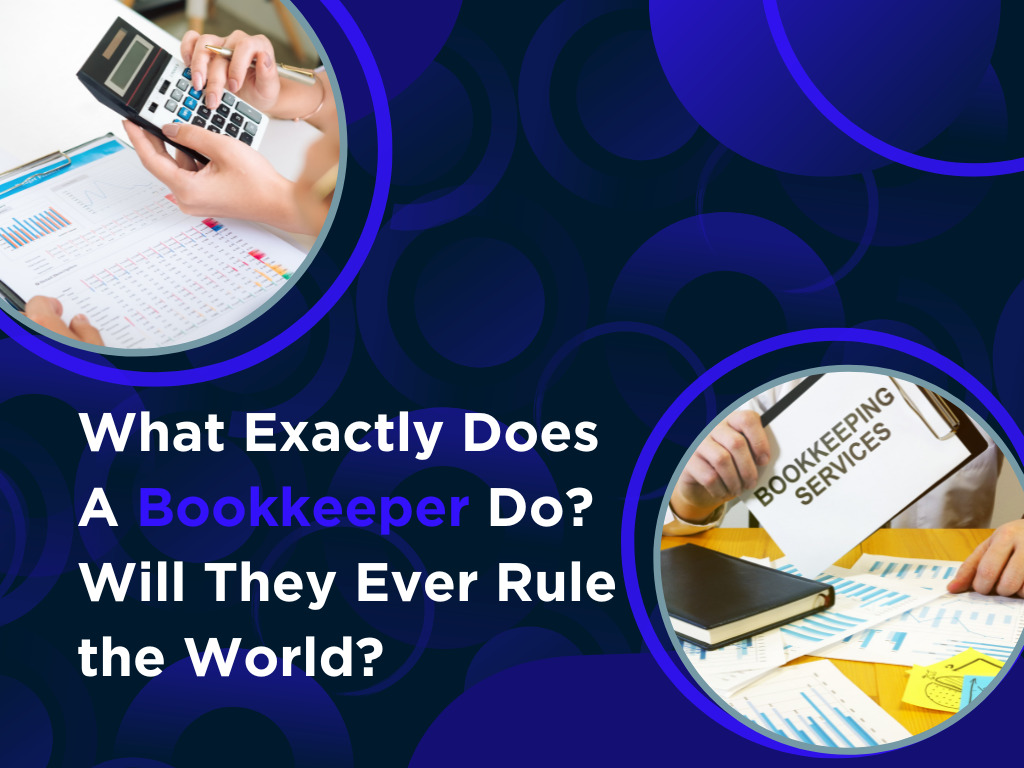
Any business that earns money and spends it needs a bookkeeper. We often hear that they are the guardians of the financial records of companies. But most people are unaware of what precisely a bookkeeper does. In this blog, we are breaking down the regular day-to-day work of a bookkeeper and also exploring if this profession is on its path to ruling the world. But first, let’s quickly understand who a bookkeeper is.
Who is a Bookkeeper?
A bookkeeper is a professional who records and manages a business’s financial transactions, such as expenses, revenue, sales, invoices, purchases, etc. A bookkeeper is part of the accounting department, and they guarantee the upkeep of a company’s financial documents, known as the ledgers.
This accounting position requires excellent time management and organisational skills simply because it involves daily updating of financial information to appropriate accounts. A bookkeeper requires a good amount of training; however, there is no requirement for a degree to begin working in this field.
In the UK, bookkeepers also play a vital role in maintaining records that meet HMRC and Making Tax Digital (MTD) requirements.
Now that you know who a bookkeeper is, let’s look at their skills, day-to-day work, and other aspects.
7 Tasks That a Bookkeeper Performs for a Business Everyday

Data Entry
- A bookkeeper uses advanced accounting software to enter your daily transactions into an organised system.
- They assign each transaction to an appropriate account so it can be tracked better.
- A bookkeeper evaluates these transactions to generate a weekly or monthly report that gives helpful information on your business’s performance.
Recording each transaction helps a company evaluate its incoming and outgoing money, so there is no wastage or chances of fraud. This data entry work saves time and money for businesses in the long run.
Bookkeepers in the UK also ensure that records meet VAT and MTD compliance standards.
Expense Tracking
Besides recording your daily financial transactions, a bookkeeper also records your daily credit card and petty cash transactions. This helps to identify which department or person is spending how much of the corporate money, which reduces wasteful expenditure.
When your business blooms, verifying if you have been receiving all the goods for which you have made payments becomes difficult. Expense tracking comes in handy in this aspect. Simply keeping an eye on your finances can help curtail financial fraud significantly. It also leads to greater accountability for the money your business is spending.
Management of Invoices and Receipts
Is your business witnessing an influx of customers? You may be finding it hard to remember which of your customers has paid their dues and which of them has outstanding due. Bookkeepers can also do this process of collecting money owed by customers while they are managing your company’s financial records.
A bookkeeper will match the goods sent with the payments received to identify any outstanding amounts. They will then send invoice reminders to customers who need to pay their dues. A good bookkeeper also takes great care to pay unpaid invoices on time and tracks any overdue payments.
In the UK, bookkeepers also make sure invoices follow HMRC guidelines, especially for VAT-registered businesses.
Maintaining cash flow for a business is a vital aspect that a competent bookkeeper can easily handle.
Processing of the Payroll
Suppose your business has a good number of employees. In that case, you may find that managing payroll is an added task that can be delegated to bookkeepers since they are already handling the financial aspect of your business.
A competent bookkeeper can check timesheets, assign due commissions, calculate payroll taxes such as PAYE, National Insurance (NI), and pension contributions (auto-enrolment). In addition, a bookkeeper also keeps a record of employees’ bank details, which comes in handy while processing the payrolls.
In the UK, bookkeepers also help with Real Time Information (RTI) submissions to HMRC.
A bookkeeper helps maintain proper employee records for a business, which can lead to the growth and scalability of your company.
Bank Reconciliation
With bank reconciliation, keeping track of receipts and payments has become increasingly easy. You can now link your online accounting software to your corporate banking accounts. This helps reconcile your banking information with your accounting details.
In addition to bank reconciliation, a bookkeeper keeps track of your debt levels and informs you of incoming payments. They may also suggest ways to reduce the interest payable on your debt.
Bookkeepers can also help manage your annual budget by keeping track of your financial data. Ledger management is a big part of financial wellness for businesses.
Keeps a Check on Cash Flow
Your cash flow determines the profitability of your business. A good cash flow indicates progress in the company, while a nasty or negative cash flow indicates that some of your expenditures need to be curtailed this month.
Calculating incoming and outgoing expenses helps determine the cash flow of a business. A bookkeeper informs you if you are running low on cash. This can help postpone any big purchases that are not urgent and may affect your cash flow in the worst possible manner. By doing so, a bookkeeper saves your business from a sudden cash crunch that can lead to problems like non-payment of salaries, etc.
Financial Reporting
A bookkeeper does not only maintain your financial records; they also curate different financial statements that can help gauge the financial health of your business. These are:
- Income statements (profit and loss statements)
- Balance sheet
- Cash flow statement
This implies that bookkeeping involves not only filling numbers in spreadsheets, as some people believe it to be. Bookkeeping requires good senses and excellent skills that one can learn over time.
To Sum It Up
Bookkeepers are helping businesses maintain accurate financial records and comply with HMRC rules in an increasingly digital-first environment. A bookkeeper’s job requires meticulous spreadsheet analysis and knowledge of financial processes. If your business is still unsure if it needs a bookkeeper, you must re-evaluate your financial standing.
FAQs
1. What does a bookkeeper do in the UK?
A bookkeeper in the UK records day-to-day financial transactions, manages invoices and receipts, handles payroll tasks like PAYE and NI, prepares VAT records, reconciles bank accounts, and ensures the business stays compliant with HMRC requirements.
2. Do I need a bookkeeper or an accountant?
You need a bookkeeper for daily financial tasks such as data entry, expense tracking, invoice management, and payroll. An accountant is required for tax strategy, year-end accounts, compliance advice, and filing company tax returns. Many businesses use both.
3. Can a bookkeeper do VAT returns?
Yes, bookkeepers can prepare and submit VAT returns as long as they understand HMRC rules and Making Tax Digital (MTD). Many UK businesses rely on bookkeepers to manage VAT reports accurately each quarter.
4. How much does a bookkeeper cost in the UK?
Costs vary based on workload and complexity. Most UK bookkeepers charge either hourly (£20–£40/hr) or monthly packages starting from £100–£350 for small businesses. Outsourced bookkeeping is usually cheaper than hiring in-house.
5. What software do bookkeepers use in the UK?
Most UK bookkeepers work with cloud accounting software such as Xero, QuickBooks, Sage, FreeAgent, and payroll tools like BrightPay or Moneysoft. These tools support VAT, MTD, payroll, and HMRC submissions.
6. Do bookkeepers need qualifications in the UK?
Formal degrees aren’t required, but many bookkeepers complete courses through AAT, ICB (Institute of Certified Bookkeepers), or ICAEW bookkeeping certificates to strengthen their skills and credibility.
7. What is the difference between bookkeeping and accounting?
Bookkeeping focuses on recording daily financial transactions accurately, while accounting involves interpreting that data, advising the business, and preparing statutory reports like year-end accounts and tax returns.
8. Can a bookkeeper help with HMRC compliance?
Yes, bookkeepers play a key role in HMRC compliance by maintaining accurate records for VAT, PAYE, NI, and MTD. However, final tax planning and filings are usually handled by accountants.
9. How often should a bookkeeper work on my accounts?
It depends on your business size. Small businesses may need weekly or monthly bookkeeping, while growing or high-volume businesses typically need daily updates to maintain accurate cash flow visibility.
10. Is outsourcing bookkeeping better than hiring in-house?
Outsourcing is often more cost-effective, gives you access to trained professionals, and ensures compliance with HMRC rules. It’s ideal for small and medium businesses that don’t need a full-time bookkeeper.
Parul is a content specialist with expertise in accounting and bookkeeping. Her writing covers a wide range of accounting topics such as payroll, financial reporting and more. Her content is well-researched and she has a strong understanding of accounting terms and industry-specific terminologies. As a subject matter expert, she simplifies complex concepts into clear, practical insights, helping businesses with accurate tips and solutions to make informed decisions.

